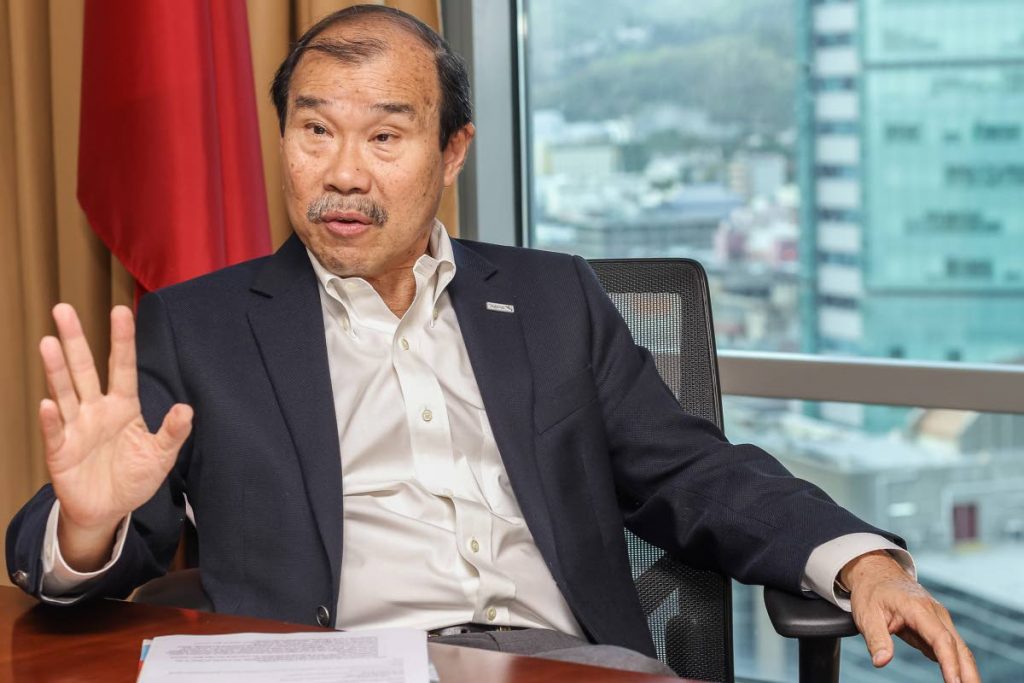Improving efficiency

When a regional corporation's 2006 financial accounts are presented to Parliament 12 years later, in 2018, there's clearly a need for improved efficiency.
Richard Young, chairman of the TT International Financial Centre (TTIFC) believes a shared services centre (SSC) can solve this problem.
"There is merit in centralising the accounting, payroll and even procurement functions of all 14 regional corporations in this country. One of the benefits of shared services is it would free you up to devote more time to your burgesses' needs."
Young made the case while speaking with Business Day about the various ways in which TT can achieve its goal of become a regional financial hub.
Shared services is defined as the provision of a service by one part of a company or group, where that service was previously done by two or more part of the company or group. When funding and resourcing of this service is shared, the providing department effectively becomes an internal service provider.
Explaining the difference between this and business process outsourcing (BPO), Young said "shared services is when it's captive – when an organisation does it for themselves – whereas BPO is when you're providing that service for somebody else."
Seated in the conference room of the TTIFC's offices, Level 15, Tower D, International Waterfront Centre, Wrightson Road, Port of Spain, Young said he first floated the idea of an SSC for regional corporations back in 2016.

"When they had the local government reform consultations (in 2016), I went to the last one in Diego Martin, where I made the point. I've also had conversations, since early o'clock, with the then Local Government Minister, Franklin Khan and with (his replacement), Kazim Hosein."
Young said making such a significant change would likely meet resistance on two main fronts – fears of job losses and possible political resistance.
"Is there willingness for all 14 to come together? I suggested if you can't do all at the same time but you do want to centralise certain functions for increased efficiency and transparency, then do it piecemeal."
He also suggested doing the same for the regional health authorities. In addition to greater transparency, accountability and efficiency, an SSC gives executives more capacity to grow the business.
As with regional corporations, "you don't have to be bogged down with support services, like if accounts are coming out on time, what are collections like. That is delegated through a service-level agreement to another part of the company. This gives you more time to go and look for business, increases your sales capacity."
The www.corehr.com article, Working Together: 3 Key Benefits of Shared Services for the Public Sector, argues that SSCs used for human resources (HR) and payroll "reduces unnecessary duplication of effort, harmonises policies and consolidates any relevant data under a single umbrella platform."
With HR and payroll professionals no longer having to handle time-consuming administrative functions, they "can start to look at better ways to address recruitment, employee engagement, talent management, workforce efficiencies and other higher value-added activities," corehr.com said.

Noting these benefits are applicable to the public and private sectors, Young said although there's a need for greater public awareness of the benefits of foreign direct investment and SSC/BPO, "three or four private sector companies are seriously looking at setting up their own shared services in TT."
While he was not able to name names just yet, Young did tell Business Day people should not equate shared services with job losses.
"Some people get cold feet because they think when duplication of effort is eliminated, it implies people but that's where reskilling comes in. This is the biggest challenge. People feel their jobs are at stake but the truth is, you have to change your approach, change your attitude, understand that you need to do things differently."
Young said this is where people need to see the opportunity SSC/BPO provides to shift their careers to more value-added skills.
Skilled labour is something TT has in abundance, Young argued, citing the Government Assistance for Tuition Expenses Programme (GATE) and the number of Association of Chartered Certified Accountants (ACCA) members in TT.
"This is now payback time for GATE. People have benefitted from GATE (including) some of the 2,000-plus ACCAs in this country. These are the ideal people for BPO, (a sector) in which we are trying to create value-added jobs for people.
"Countries like Hungary and Poland have developed a massive BPO industry. Multi-nationals have put their shared services in those countries, so there's no reason why TT can't do some of that. It provides good, sustainable jobs."
Energy sector BPOs are another idea Young would like to see implemented, something which would tie in nicely with government' goals of diversification and a greater share of the pie from TT's depleting oil and gas reserves.
"When we negotiate these new contracts with these multi-nationals, maybe one of the conditions we need to put in is that they need to have a shared services shop here to serve their regional operations."
In line with this, the TTIFC is also in the process of exploring the viability of developing a financial technology (FinTech) centre of excellence.
Young said the TTIFC is also exploring the viability of data analytics for private companies.
"This is not to be confused with Cambridge Analytica in any way. Many companies gather data and you need people with the depth of mind to take that data and generate forecasting, useful information. A simple example would be taking a loyalty programme and really using that data to glean information for marketing (et cetera). In the same way Amazon tracks what you look at or buy on their website, then uses that to make future recommendations."
Asked about how crime affects the TTIFC's marketing efforts, Young said "it is a deterrent, to a degree, but I think when investors understand the dynamics of any city, they get it. (Investing here) is like any other city around the world, there are areas where you have to be careful."
He also urged citizens to be more welcoming to potential investors, saying "it's not about people coming to take over your jobs. It is about understanding that to attract people, we have to welcome them.
"The country needs to understand what foreign direct investment means, at all levels. From the immigration officer right down to the taxi driver. We have investors coming in here and (sometimes) we treat them like criminals. Yes, there are some 'smart' people trying to come in here but sometimes we end up painting everybody with the same brush."

Comments
"Improving efficiency"